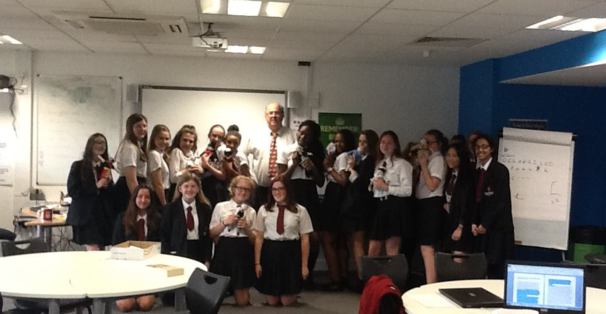
WALT: What was the significance of the Reichstag Fire?
WILFs - Can describe and explain narrative of events (D).... Can explain how Hitler used the Reichstag Fire in his journey from Chancellor to Fuhrer (B)....Can assess the significance of the Reichstag Fire in a supported judgement (A)
Lesson Development
1. Starter: Circulate the room and 'Share a Fact' with everyone who meet on - Hitler's rise to power then Rally
Robin how Hitler went from Chancellor to Fuhrer in 7 steps
2. Return to your desks and write down the 7 steps from memory
3. Now with your Study Buddy study the PPT and take notes and complete
identified tasks
4. Watch the movie clip and read the text below - how did Hitler use the RF for his own purposes?
5. Promenade your partner - link arms and stroll around the room discussing whether the Reichstag Fire the most important factor in Hitler's rise to Power?
5. Stand and Share
6. Mini Plenary: Mix Pair Share - with a new partner discuss the
following;
a) How important was the Reichstag Fire in Hitler's rise to power?.... come to a judgement
b) How did Hitler use the Reichstag Fire to achieve dictatorial powers..... describe
7. Pair up and design a newspaper frontpage telling ther story of the Reichstag Fire. You can chose to write from either a Communist or Nazi perspective
8. Plenary - Mix Pair share the WILF or Paraphrase passport what you have learnt today. In a Paraphrase Passport form a circle of 6-8
students. Each student has to add a valid point. Before your go you must recall all the points made before you.
| Order of the Reich President for the Protection of People and State | |||
|---|---|---|---|
| Auf Grund des Artikels 48 Abs. 2 der Reichsverfassung wird zur Abwehr kommunistischer staatsgefährdender Gewaltakte folgendes verordnet: | On the basis of Article 48 paragraph 2 of the Constitution of the German Reich, the following is ordered in defense against Communist state-endangering acts of violence: | ||
| § 1. | Die Artikel 114, 115, 117, 118, 123, 124 und 153 der Verfassung des Deutschen Reichs werden bis auf weiteres außer Kraft gesetzt. Es sind daher Beschränkungen der persönlichen Freiheit, des Rechts der freien Meinungsäußerung, einschließlich der Pressefreiheit, des Vereins- und Versammlungsrechts, Eingriffe in das Brief-, Post-, Telegraphen- und Fernsprechgeheimnis, Anordnungen von Haussuchungen und von Beschlagnahmen sowie Beschränkungen des Eigentums auch außerhalb der sonst hierfür bestimmten gesetzlichen Grenzen zulässig. | § 1. | Articles 114, 115, 117, 118, 123, 124 and 153 of the Constitution of the German Reich are suspended until further notice. It is therefore permissible to restrict the rights of personal freedom [habeas corpus], freedom of opinion, including the freedom of the press, the freedom to organize and assemble, the privacy of postal, telegraphic and telephonic communications. Warrants for House searches, orders for confiscations as well as restrictions on property, are also permissible beyond the legal limits otherwise prescribed. |
Key Events
On 27th February, 1933, the Reichstag caught fire. When they police arrived they
found Marinus van der Lubbe on the premises. After being tortured by the Gestapo
he confessed to starting the Reichstag Fire. However he denied that he was part
of a Communist conspiracy. Hermann Goering refused to believe him and he ordered
the arrest of several leaders of the German Communist Party (KPD).
When Hitler heard the news about the fire he gave orders that all leaders of the
German Communist Party should "be hanged that very night." Paul von Hindenburg
vetoed this decision but did agree that Hitler should take "dictatorial powers"
under Article 48 of the Weimar constitution. The Decree enabled the Nazis to
ruthlessly suppress opposition in the forthcoming election. KPD candidates in
the election were arrested and Hermann Goering announced that the Nazi Party
planned "to exterminate" German communists.
Although it was extremely difficult for the opposition parties to campaign
properly, Adolf Hitler and the Nazi Party still failed to win an overall victory
in the election on 5th March, 1933. The NSDAP received 43.9% of the vote and
only 288 seats out of the available 647. Despite many leading Communists and
Social democrats languishing in concentration camps the Communists won 81 seats
(12% of the vote) and the Social Democrats won 120 seats (18% of the vote).
As well as Marinus van der Lubbe the German police charged four communists with
setting fire to the Reichstag. This included Ernst Torgler, the chairman of the
KPD and Georgi Dimitrov of the Soviet Comintern.
On 23rd March, 1933, the German Reichstag passed the Enabling Bill (aka Law for
Terminating the Suffering of People and Nation). This banned the German
Communist Party and the Social Democratic Party from taking part in future
election campaigns. This was followed by Nazi officials being put in charge of
all local government in the provinces (7th April), trades unions being
abolished, their funds taken and their leaders put in prison (2nd May), and a
law passed making the Nazi Party the only legal political party in Germany (14th
July).
Marinus van der Lubbe was found guilty of the Reichstag Fire and was executed on
10th January, 1934. Adolf Hitler was furious that the rest of the defendants
were acquitted and he decided that in future all treason cases were taken from
the Supreme Court and given to a new People's Court, where prisoners were judged
by members of the National Socialist German Workers Party (NSDAP).

